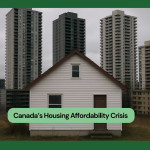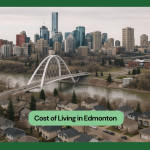If you’re thinking about moving to Edmonton, you’re probably wondering: How much does it really cost to live here? Good news—Edmonton remains one of Canada’s most affordable major cities, offering a great mix of urban living and reasonable expenses. Whether you're renting, buying a home, or just budgeting for daily life, here’s the latest breakdown.
Edmonton Cost of Living 2025: Housing & Rent Prices
Edmonton’s real estate market remains stable, with prices much lower than in bigger cities like Toronto or Vancouver.
Average Home Prices
| Type | Price Range |
|---|---|
| Condos | $220,000 – $350,000 |
| Townhouses | $320,000 – $450,000 |
| Single-Family Homes | $420,000 – $650,000+ |
| Luxury/New Builds | $700,000+ |
Most affordable neighbourhoods: Mill Woods, Castle Downs, Beverly
High-demand areas: Windermere, Glenora, Terwillegar
Renting in Edmonton
1-bedroom apartment (downtown): $1,300 – $1,700/month
1-bedroom (suburbs): $1,000 – $1,400/month
3-bedroom house: $1,800 – $2,500/month
Tip: Rent prices have risen slightly since 2024, but Edmonton is still 30–40% cheaper than Vancouver or Toronto.
Cost of Utilities in Edmonton
Expect these average costs for a 1,200 sq. ft. home:
Electricity & Heating: $160 – $280/month (winter peaks can hit $350)
Water & Waste: $80 – $130/month
Internet (fibre/cable): $70 – $110/month
Home Insurance: $90 – $160/month
Tip: Alberta’s energy rebates (like the Affordability Payments) can help offset costs—check eligibility!
Groceries & Everyday Costs
Food prices have stabilized since the inflation spikes of 2023–24. Here’s what you’ll pay:
| Item | Average Cost |
|---|---|
| Milk (1L) | $2.60 |
| Bread | $3.20 |
| Eggs (dozen) | $4.80 |
| Chicken (1kg) | $12 |
| Monthly groceries (single person) | $350 – $550 |
| Monthly groceries (family of 4) | $900 – $1,300 |
Eating Out
Fast food meal: $10 – $15
Mid-range restaurant: $18 – $35 per person
Coffee (latte): $4.50 – $6
Transportation - Driving vs. Transit
If You Drive
Gasoline (June 2025): ~$1.45 – $1.75/L (still cheaper than BC & Ontario!)
Car insurance: $100 – $220/month (Alberta has private insurance, so shop around)
If You Use Transit
Adult monthly pass: $105
Single fare: $3.80
Tip: Edmonton’s Valley Line LRT expansion (opening late 2025) will improve transit access!
Taxes - The Alberta Advantage
No provincial sales tax (PST)—just 5% GST
Lower income tax vs. most provinces
Property tax rate: ~0.9% of assessed value (*about $3,600/year on a $400,000 home*)
Final Verdict - Is Edmonton Affordable in 2025?
Yes! While costs have risen slightly since 2024, Edmonton remains one of Canada’s most budget-friendly cities for:
✔ Homebuyers (cheaper than Calgary, Toronto, Vancouver)
✔ Renters (lower prices than major metros)
✔ Families (good wages + lower daycare costs)
Thinking of Moving?
Check out TheHOMESS.com for the latest Edmonton real estate listings, neighbourhood guides, and expert tips!
FAQs
- Q: Is Edmonton cheaper than Calgary?
A: Yes, by about 5–10%—housing, utilities, and insurance tend to be lower. - Q: What salary do you need to live comfortably in Edmonton?
A: Single person: $50,000+, Couple: $75,000+, Family of 4: $90,000+ - Q: Are groceries expensive in Edmonton?
A: No, Edmonton grocery prices match the national average and are 5-15% cheaper than in BC or Ontario, with great deals at local markets.
Related posts:
Confused between new construction and resale homes in Canada for 2026? Compare costs, value, timelines, and find the best option for your budget and lifestyle.
Discover affordable ways to create a cozy Canadian home this winter. Budget décor, lighting, and DIY ideas to keep your space warm and stylish all season.


 New Construction vs Resale Homes in Canada: Which Should You Buy in 2026?
New Construction vs Resale Homes in Canada: Which Should You Buy in 2026?  How to Make Your Canadian Home Cozy on a Budget: Winter-Proof Décor Tips
How to Make Your Canadian Home Cozy on a Budget: Winter-Proof Décor Tips  5 Real Estate Investment Trends Every Canadian Investor Should Know in 2025
5 Real Estate Investment Trends Every Canadian Investor Should Know in 2025  Why Canada’s Housing Affordability Crisis Isn’t Over Yet
Why Canada’s Housing Affordability Crisis Isn’t Over Yet  Cost of Living in Edmonton (2025) - Rent, Homes & Daily Expenses
Cost of Living in Edmonton (2025) - Rent, Homes & Daily Expenses